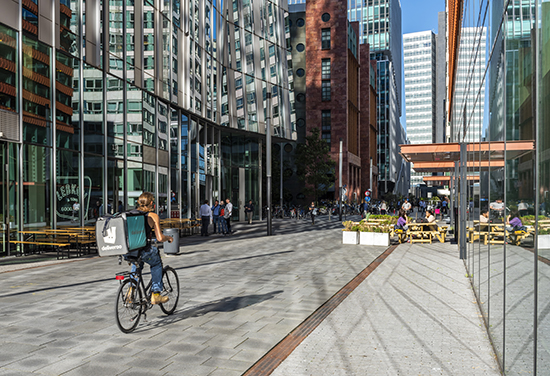Each crisis has its winners and losers and, during this pandemic one clear winner has particularly stood out, as a recent survey has shown: takeaway and grocery delivery. The Netherlands has a long tradition of grocery deliveries: from 1966, the ‘moving supermarket’, known as the SRV, became a household name on the streets all over the country. Even before this, bakeries, butchers and milkmen were already delivering to people’s homes. But when it comes to meal and grocery home deliveries, the pandemic has caused an unprecedented boom, a survey has found. According to the Food Service Institute Netherlands (FSIN), the overall food delivery market in the Netherlands grew by more than 43 percent last year, and its figures show that so-called ‘delivery players’ accounted for nearly 10 percent of the total food and drink expenditure.
Takeaways and groceries
Last year, takeaway delivery accounted for nearly 23 percent of the total out-of-home food and drink market. The recently published Foodshopper Monitor, an annual survey by the FSIN that looked at the effects of the crisis on consumer behaviour, and in particular at the aspects convenience, budget and enjoyment, shows that the delivery of takeaways grew by 37 percent, to more than € 2.7 billion euros in 2020. Without Covid-19, the FSIN said, this would have been around 14 percent. An even bigger winner, the survey found, was grocery deliveries. Instead of the projected growth of € 600 million, in 2020 the delivery of groceries by food retailers (supermarkets and speciality stores) increased by an estimated 49 percent to almost € 2.7 billion. All in all, this has brought the total market share of food retail (including wine delivery, cakes and DIY cooking boxes) to 6.1 percent, it was reported.
Really taken off
“Covid has acted as a driving force,” said Inga Blokker, director of The Food Research Company, the research agency of the FSIN. In a press release and in various Dutch media, she confirmed that food delivery, although a growing trend for some time, has now really taken off. “People who had never ordered before, have now been forced to discover the convenience of having hot meals and groceries delivered at home,” she said. According to Blokker, time has moved forward by a few years with regard to the growth of the delivery market. While delivery services have opened a large number of new branches this year, chains and restaurants that previously offered little or no delivery service also made the switch quickly.
Change in variety
But it wasn’t just numbers, the variation has also increased. The survey showed that consumers are no longer ordering meals just on Sunday evenings, but also more often on weekdays. The platform for Dutch greenhouse vegetable cultivation, groentennieuws.nl, also reported that the numbers reveal a new picture: younger generations in particular increasingly opt for delivery when they just don’t feel like cooking. In the past, millennials and the so-called Generation Z may have decided to “cook anyway”, since Covid, having a meal delivered is the most frequently cited alternative when they don’t feel like cooking. They also prefer this to a ready-to-eat meal from the supermarket.
Future structural growth
The growth that has now been accelerated will not simply disappear once the Covid measures are over, said Blokker, who foresees that after corona “even people who did not order food or groceries before will continue to do so, every now and then,” and that the trend of takeaway delivery promises future growth for the delivery market. “Although the delivery turnover will certainly not increase as much in 2021 as in 2020, as far as food delivery is concerned, the signals for future growth are promising,” Blokker said. This positive prognosis was echoed by Philippe Vorst, CEO of the Dutch chain New York Pizza, whose company experienced ‘extreme’ growth last year: 20 percent. He says the 221 stores had “never sold as many pizzas as last year”, and, as he told AD newspaper, he expects this to continue: “Someone who now has meals delivered will not stop ordering.” But, as Vorst added: “Our success means that others suffer. I would rather have it differently,” highlighting that, when there are winners, there will also be those that lose out.
Written by Femke van Iperen
